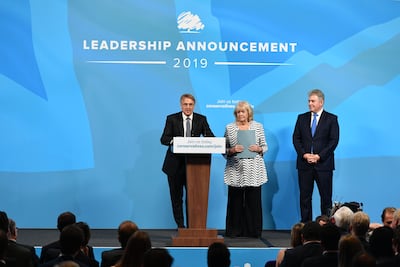Two years ago Boris Johnson was a dominating presence on the world stage, hosting some of the most powerful leaders at a G7 summit in Cornwall.
Today his future in British politics lies at the mercy of seven lesser-known politicians, whose judgements could end the once-dominant force of the Conservative Party.
It may be just as well that Mr Johnson, 58, has earned £4.8 million ($5.9 million) since resigning as prime minister in July last year, as the make-up of the MPs interrogating him on the Privileges Committee means he is unlikely to be given much sympathy.
While the committee includes one member to whom he is distantly related and old Brexit comrades, such have his political fortunes turned that there is a real danger the committee will unanimously vote for a 10-day or more suspension for misleading parliament over the partygate affair.
That would almost certainly trigger a by-election in which Mr Johnson could lose his seat as an MP and an important base for any political resurrection.
In the hearing, which is the closest British equivalent to a US impeachment trial, the committee's seven members will determine the fate of the UK's most charismatic politician in a generation.
Harriet Harman, Labour
MPs from all parties listened intently when the Privileges Committee’s chairwoman Harriet Harman was among the first to pay tribute in the House of Commons to the late Queen Elizabeth II last year.
Her successful 41-year political career has earned cross-party respect. She served in five ministerial posts, including cabinet posts, and was twice acting Labour party leader.
Mr Johnson would do well not to antagonise the Mother of the House, the longest-serving female MP, but he will also hope that a distant family alignment and their previous good relations might play in his favour.

Ms Harman’s cousin, Lady Rachel Billington, is Mr Johnson’s godmother. Also, when Ms Harman’s husband Jack Dromey, a fellow Labour MP, died unexpectedly in January last year, it was the former prime minister who graciously led the tributes.
Ms Harman’s wiliness as a politician has been reinforced by her years as a fearless civil liberties lawyer, and she was Britain’s solicitor general from 2001 to 2005.
Charles Walker, Conservative
Regarded by Lobby journalists as among the most decent and honourable Conservative politicians, Charles Walker is expected to robustly maintain his impartiality.
Despite being from the same party, Mr Johnson cannot expect soft questioning from the MP whose outburst labelling Liz Truss’ effervescent administration “a shambles and a disgrace” was regarded as a damning and terminal condemnation.

More importantly for Mr. Johnson, the MP was vehemently against the government's continued pandemic lockdowns, describing them as an egregious attack on civil liberties. This position is unlikely to endear him to Mr Johnson, who implemented the rules and then was accused of breaking them.
Like Ms Harman, Mr Walker, 55, will also be leaving parliament at the next election, possibly giving him more freedom to speak his mind.
He was also among the first Tories to condemn Mr Johnson in the early days of the partygate scandal, suggesting that he could “start the process of healing” by quitting as prime minister.
Sir Bernard Jenkin, Conservative
A strong-willed and stubborn Brexit supporter, Mr Johnson may regard Bernard Jenkin as a natural ally.
But during his chairmanship of the powerful liaison committee that grills serving prime ministers, Mr Jenkin has shown himself to be not entirely sympathetic to Mr Johnson, while content to give him a fair hearing.
However, that equitable approach may have been damaged after he alleged last year that Mr Johnson’s allies had conducted a “terrorist campaign” against the Privileges Committee by attempting to “discredit” it.
Mr Jenkin, 63, is also a long-serving MP after three decades in the Common and another whose political career is in its autumnal years.

Mr Johnson can also expect few favours from the remaining four members of the committee.
While Alberto Costa is a fellow Tory, he was strongly against Brexit and later campaigned for the protection of EU citizens’ rights. As a trained solicitor and former government lawyer in the UK Treasury he will be posing some sharp questions.
Just four years into his parliamentary career, Andy Carter, a “red wall” Conservative, is regarded as independent-minded, and has stated that he treats those before the committee “the same, regardless of their position or party.”
The remaining two MPs are Labour’s Yvonne Fovargue, who is no friend of Mr Johnson, and the Scottish National Party’s Allan Dorans, who will probably bring his forensic experience as a former detective in the Metropolitan Police into play.
Mr Johnson can therefore expect little favouritism to be shown during his four-hour interrogation, with the beaches of Cornwall and fine dining with US President Joe Biden only details in his memoirs.












































